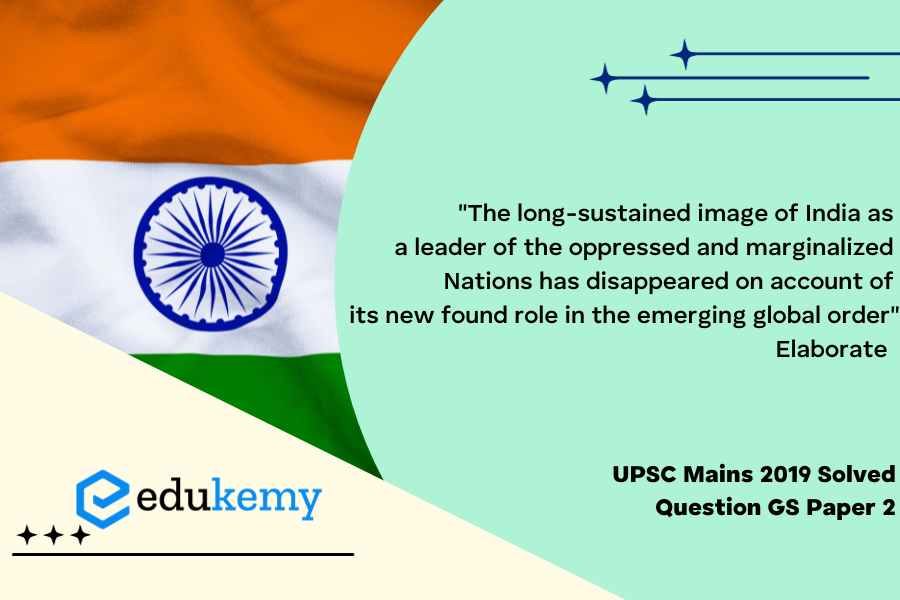The historical perception of India as a stalwart leader championing the cause of oppressed and marginalized nations has undergone a profound transformation in the wake of its evolving role within the emerging global order. Traditionally, India was celebrated as a symbol of resilience against colonialism and a vocal advocate for the rights of the downtrodden. However, the dynamics have shifted, and the once-long-sustained image is now tinged with nuances reflecting India’s recalibrated stance in the international arena. This shift is multifaceted, marked by changes in foreign policy priorities, economic repositioning, and strategic alliances that have reshaped India’s role on the global stage.
One notable factor contributing to this transformation is India’s pursuit of economic growth and development, which has propelled it into the ranks of emerging economic powerhouses. As the nation strives for economic ascendance, there is a discernible shift in focus from purely ideological solidarity with the oppressed to pragmatic engagement with global economic forces. This change has seen India actively participating in forums that shape the international economic landscape, fostering partnerships with nations that align with its economic interests. Consequently, the narrative of India as a leader of the oppressed has been overshadowed by its pursuit of economic prosperity and influence in the global economic order.
Furthermore, geopolitical considerations and strategic alliances have played a pivotal role in redefining India’s image. In response to evolving security challenges and geopolitical realignments, India has engaged in strategic partnerships that prioritize national interests over traditional solidarity with marginalized nations. This pragmatic approach has, to some extent, diminished the perception of India as a champion for the oppressed.
Tag: Global groupings.
Contents
Decoding the Question:
- In the Introduction, try to briefly write about India as a leader of the oppressed and marginalized Nations.
- In Body,
- Discuss India’s newfound role in the world order and how it evolved.
- In Conclusion, try to end your answer by summarizing India’s approach.

Answer:
India’s foreign policy is based on the philosophy of “Vasudhaiva Kutumbakam” and “Sarve Jana Sukhino Bhavantu”. Since the Indian freedom struggle, India has advocated oppressed and marginalized nations (Third World). It has raised its voice in world forums for the socio-economic and political development of all. India is a founding member of the Non-Alignment Movement (NAM) and G77, which propagates its vision among the newly independent countries having weak military, economic, and development aspects.
India’s New Found Role in the Emerging Global Order:
- Economic Development is now a major agenda of India’s growth as a world power, which is now reflected in India’s foreign policy.
- The end of the Cold War and the growing impacts of globalization made India redefine its position and role both at the regional and global levels. It now prefers multi-alignment rather than non-alignment. For example, SCO, BRICS, QUAD, etc.
- In the recent past, the Indian government’s foreign policy priorities have tilted towards the US and the neoliberal framework.
- This trend was observed in the NAM Summit Havana 2006, where India focused on anti-terrorism, nuclear disarmament, energy security, investing in Africa, and such issues that are vital to India’s growth and don’t resemble the priorities of developing or marginalized countries.
- India has actively supported the cause of developing and marginalized nations in Climate Change negotiations by thrusting on “differentiated responsibility” but recently diluted its stand in Paris negotiations.
- India has also been blamed for interfering in the internal affairs of neighboring countries, for instance, Nepal, which led to friction in relations between the two nations.
- In the regional forum SAARC, India has hard-pressed its agenda of boycotting Pakistan, which resulted in the non-functioning of SAARC, which may result in delaying development projects of SAARC in our smaller neighboring nations.
- India’s involvement in QUAD, its focus on Indo-Pacific Regional Growth, and countering China have become its top priorities.
India is transforming itself from a leader of the third world to a global leader, With univocal support for the multipolar world across the globe. India is one of the poles of global diplomacy, and every step of India is watched keenly. These inferences are pointing toward a shift in India’s approach from the leader of the oppressed countries to a great power on its terms. India’s approach is shifting from Idealism to Realism and is prioritizing its national interests over the collective interests of the developing countries.
In case you still have your doubts, contact us on 9811333901.
For UPSC Prelims Resources, Click here
For Daily Updates and Study Material:
Join our Telegram Channel – Edukemy for IAS
- 1. Learn through Videos – here
- 2. Be Exam Ready by Practicing Daily MCQs – here
- 3. Daily Newsletter – Get all your Current Affairs Covered – here
- 4. Mains Answer Writing Practice – here


